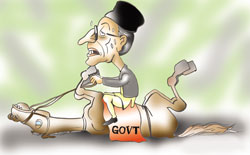|
|
WASHINGTON DC-At the Global Leadership Forum here this week, this self-proclaimed Beed realised just how little he knew.
When participants from more than 85 developing countries converge to discuss issues, diversity has to find a new definition. Interestingly, many believe that DC cab drivers going on strike on Thursday were learning from Nepal. They were protesting the introduction of metering, believe it or not. Most DC drivers (98 percent of them immigrants) accuse large taxi companies of wanting to dislodge individual owners.
At the Forum itself discussions looked ahead to what's in store for developing countries in the next 20 years. While there are many challenges that one can prioritise, lack of governance stood out as the main one. Zimbabwe was mentioned a lot. A country that 30 years ago had one of the strongest currencies in the world, boasted near 100 percent literacy and was called the bread basket of Africa, is now a basket case with a stereotypical tinpot dictator. It just goes to show that when countries start sliding it all happens very quickly, and it's usually due to leadership failure.
Nepal witnessed phenomenal overall growth between 1990 and 1995. But all that evaporated when the political squabbling began. Today, with G P Koirala trying to fill the shoes of the abominable kingman and perpetuating his own power once again, the memories of politics killing the economy are coming alive again. The fear of defeat in the Maoist camp coupled with the fear of the sun setting on the Koirala dynasty keep elections to the constituent assembly a mirage.
The way certain vested groups moved to the street to protest against the hike in petroleum product prices shows that politicians never understand how the economy works. In the UK, the price of petrol is already above one pound, which is double what we pay in Nepal. With a looming confrontation between the US and Iran, the price of oil will soon cross the $100 per barrel mark. Not recognizing these global trends would only lead to economic, and ultimately political, hara-kiri.
In the US by contrast, the economy determines politics. The mortgage and sub-prime issues leading to a dip in the housing market resulted in lower consumer spending and threatened to send the entire economy into a spin. A low economic growth rate, coupled with high inflation and high unemployment, would make the US economy - which borrows so much - far more fragile. If the economy takes a hit, there is no way the Republicans can get their candidate elected the next president.
The more we in Nepal allow politicians to hold our economy hostage, the worse off we will be. If we can't take decisions on power projects despite having two power summits, or if we can't decide that petroleum products are something that the state has to buy and sell, or if we do not want to examine the impact of a deteriorating economy, there is little that anyone can do to help us.
Your Beed has been optimistic over the last couple of years, but perhaps for the first time, one feels that the country is loosing steam. By leaving it all to politics, we have put the cart before the horse.




